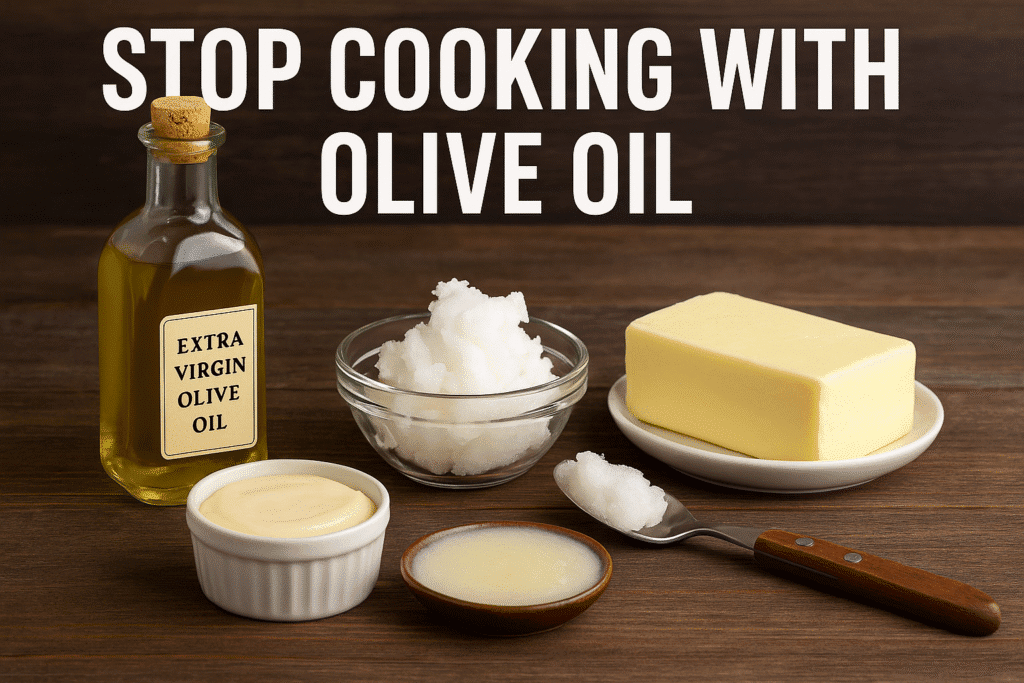Let’s cut straight to it: if you’re still cooking with olive oil or avocado oil, thinking you’re doing something healthy — you’re not. I know that sounds dramatic, but once you understand how these oils react to heat, you’ll never look at your sauté pan the same way again.
The Real Problem: Oxidation
Here’s the deal — fats like olive oil and avocado oil are monounsaturated, which means they have double bonds in their structure. Sounds harmless, but those bonds make the oil unstable when exposed to heat, oxygen, or light. And when they break down, they form oxidized byproducts like aldehydes and lipid peroxides — stuff that promotes inflammation, cell damage, and chronic disease.
So yeah, avocado oil has a high smoke point. That doesn’t mean it’s safe to cook with — it just means it won’t visibly smoke until it’s already oxidizing. The real question isn’t “how hot can I heat this oil?” — it’s “how stable is this fat under heat?”
The more unsaturated the fat, the more fragile it is. And when you heat it? You’re basically creating toxic sludge and pouring it all over your food.

So What Should You Cook With?
You want fats that are saturated — stable, solid at room temperature, and biologically compatible with how we evolved to eat. These are the fats our ancestors cooked with for thousands of years before Crisco and canola showed up to ruin dinner.
Here’s what I use — and what you should too:
- Beef tallow – stable as hell, high in fat-soluble vitamins, and makes everything taste better
- Butter or ghee – solid at room temp, delicious, and loaded with vitamins A, D, E, and K2
- Coconut oil – great for certain recipes, and loaded with MCTs
- Duck fat or lard – also rock solid and deeply ancestral
These fats don’t oxidize when you heat them. They’re literally built for cooking. And your body knows exactly what to do with them.
But What About Olive Oil?
Olive oil isn’t evil — it’s just misunderstood. It’s fine raw, like on a salad or drizzled on steak after it’s cooked. But heating it? That’s where the wheels fall off.
Even high-quality, extra virgin olive oil is fragile under heat. Those heart-healthy polyphenols? They break down. The monounsaturated fats? They oxidize. You end up with something that’s far removed from that beautiful Mediterranean image we’ve all been sold.
Same goes for avocado oil. Stop pouring it into your frying pan like it’s magic. It’s not. It’s marketing.
The Big Picture
Cooking with oxidized oils isn’t just about inflammation — it’s about systemic stress. You’re putting your mitochondria under fire every time you cook with unstable fats. You may not feel it today, but over time, it adds up — in your skin, your joints, your energy, your hormones.
And that’s why I only cook with saturated fats that are solid at room temp. Not because it’s trendy — but because it’s biologically sound. We’re not meant to eat oils created in factories or pressed out of soft fruits and blasted with heat.
Let’s stop playing defense with our food. Go on offense. Cook with fats that fuel you.
Sources:
- Saladino, P. (2020). The Carnivore Code.
- Knobbe, C. (2019). Ancestral dietary practices vs. industrial seed oils.
- Ghosh, S. (2018). “Lipid peroxidation and human health” – Current Opinion in Clinical Nutrition.
- Grootveld, M. (2017). “Thermal degradation of cooking oils” – Food Chemistry.
- Saladino Podcast: “Why You Should Never Cook with Olive Oil”

Leave a Reply